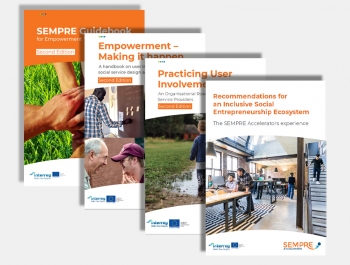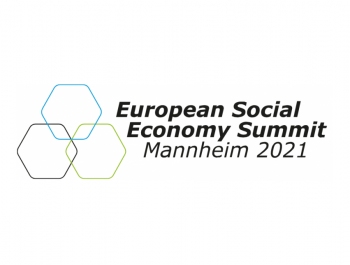In order to present its achievements and outputs, SEMPRE Accelerators showcased the outcomes of its micro projects at the European Social Economy Summit 2021 (EUSES) on 26th May 2021. Broadcasted from Mannheim, the online conference’s goal was to reinforce the European social economy to make better use of its contribution to economic development, social inclusion and green as well as digital transitions.
Under the name of “Social Service Co-Creation”, SEMPRE Accelerators held a session for part of the 3000+ registered participants interested in the development, execution, outcomes as well as lessons learned from the micro-project implemented. Hence, contributing with valuable insights on social inclusion and economic development, three of the social start-ups from SEMPRE Accelerators were introduced through presentations, videos and short Q&A sessions: The Stopover Coffee Shop, Hear me Out, and Newspaper & Web: Integration of Migrants and Refugees. Additionally, the Karelian Research Centre RAS, which had joined the partnership at a later point in time, presented its results from the testing of the tools for active involvement of service users in the design, development and delivery of a new or improved social service. These were defined during the predecessor project of SEMPRE Accelerators.
Followed by an introduction about the data and overarching goals of SEMPRE Accelerators given by Nicole Rönnspieß from the Diaconie of Schleswig-Holstein, Anna Broka from our project partners at VUAS presented the Stopover Coffee Shop. The shop is a social enterprise gathering young people and disadvantaged groups living in Liepa (Latvia) and the surrounding area. The idea behind the coffee shop is to create a platform for co-creation, a platform for the exchange of experience, expertise and social innovation: it is not only about coffee and cakes, but about new ideas and inspirations and creating a place to develop these imaginations at another level – a centre for services and local products, coffee and cakes, local tastes and SEMPRE Liepa handmade souvenirs that are offered to tourists, locals and people passing by. The idea is to provide inclusive workplaces for people outside the labour market (such as single parents or people with disabilities) and to create a platform for education, training and practice (i.e. apprenticeships) to support the transition to the regular labour market. Anna shared with the audience some of the micro-project’s many learning experiences, including the acknowledgement of the benefit of failures, better employability through co-creation of services as well as seeing the advantage in seemingly disadvantaged situations like the COVID-19 pandemic, having allowed them to further improve and strengthen their concepts for the Stopover Coffee Shop. You may learn more about the StopOver Coffee Shop in the video below, which was also shown during the EUSES session.
Hear Me Out is an initiative for young and grown-up people with mental health difficulties. The purpose of the project is to develop methods and activities so people with mental health difficulties are empowered, can make their voices heard in society and express themselves in order to fight prejudice and inform others about their difficulties and their challenges. Under the framework of this summit, Mette Nyholm and Brian Dam from UCSyd in Denmark presented their project goals and eventually, wrapped it up with the current status and progress of this project. Showcasing again the initial idea of this micro-project as well as its big success, they pointed out that over time, podcasts in Danish had been developed and that activities are most likely to continue after the end of the project, making this micro-project truly sustainable.
Newspaper&Web operates at the nexus of journalism and social innovation and aims at supporting the integration of migrants and refugees with low to medium German language skills. Martina Sievertsen and Hartwig Wagemester (Academy of Economics Schleswig-Holstein) showed how Newspaper&Web empowers refugees to publish articles about their cultural backgrounds, their life circumstances in the past (e.g. reasons for escaping from home countries, escape routes), their current situation, their hopes and their future plans, they are gaining agency and are at the same time building a bridge between the locals and newcomers. The project not only supports the integration of migrants into society, but also comes with an individual development perspective for the participants.
The Karelian Research Centre RAS joined the project at a later stage and tried out the social empowerment tools as defined by SEMPRE and SEMPRE Accelerators project. These tools were put forward, first, for needs assessment to determine service needs in a way that promotes the active involvement of service users, and second, for service design to encourage service providers and service users to step outside their usual thought patterns and work together in order to create new ideas. Methods like e.g. the Future Workshop, the Backpack method or the Business Model Canvas were evaluated together with several groups from different local social initiatives in Karelia. Results were regarded as mainly positive, and applicability of methods was proven.
The session concluded with a short panel discussion together with the project coordinators, exploring their thoughts on the projects’ general sustainability and on where they see their social start-up micro-projects in the future.




